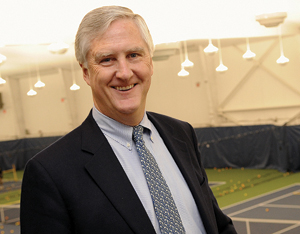The U.S. Tennis Association, which owns and operates the U.S. Open, has signed Gordon Smith to a second four-year term as executive director, taking him through 2015.
The terms of the deal, Smith said, are similar to his first deal, which expires Dec. 31. He earned an average of $1.15 million a year in the first two years of that deal, according to the USTA’s most recent tax returns.
Smith also said that the USTA as a whole earned $46 million last year, up 45 percent from three years ago. The Open itself earns more than $100 million, fueling the not-for-profit USTA’s mission to promote the growth of tennis.
 |
USTA
Among the challenges for Gordon Smith's next term: getting young people to play, developing U.S. pro champions. |
An attorney from Atlanta, Smith, 57, has focused the group’s attention on promoting recreational tennis. That emphasis led in part to the departure three years ago of Arlen Kantarian as the group’s high-profile head of pro tennis, a position Smith did not fill.
“Smith really got rid of the silos, with community tennis and pro tennis being separate,” said Ilana Kloss, CEO of World TeamTennis. The USTA owns a part of WTT.
Kloss also pointed out an attribute of Smith that is important in the insular world of tennis: Smith is passionate about the sport and has worked at the grassroots level. He went to the University of Georgia on a tennis scholarship and later ran the USTA section that oversees tennis in the South.
What others are saying about:
GORDON SMITH
■ “It’s quite amazing to me in two years he really changed the culture and the thinking of the USTA organization. He’s tried very hard to move community tennis together with pro tennis. … He has really targeted the 10 and under kids coming up. In America, we are trying to get the best athletes. We are fighting hard to get the younger kids to play tennis.
“[He is] getting grassroots tennis much more in front of the minds of the USTA, the USTA board and the sections.”
Donald Dell
Lagardère Unlimited
Group president
■ “Despite a tough economic environment, he has provided leadership to drive the U.S. Open and U.S. Open Series to new levels of popularity and commercial success, and he has effectively utilized these professional tennis assets as catalysts to promote the sport and raise the profile of the under-10 program.
“Gordon is a true leader and cooperative visionary. He has the best interests of the sport always top of mind, and the game is privileged to have him.”
Stacey Allaster
WTA Tour
CEO
■ “I remember talking to him when he took the job, and Billie [Jean King, founder of WTT] and I were like, ‘Why do you want to do this?’ And he said, ‘Everything I am, I am because of tennis.’ Tennis gave him an opportunity to go to college — he had a scholarship — so this gave him an opportunity to give back. I was really struck by that, that he really has a passion for the sport, and I think that is huge.“
Ilana Kloss
World TeamTennis
CEO
Smith identified four key challenges for his next term: getting young people to play the game, improving the U.S. Open, increasing revenue and developing American pro champions.
“We need to create a whole new generation of young people playing the game,” he said during a recent breakfast near his upper west side Manhattan home.
As such, the big push this year for the USTA has been a new program to get kids ages 10 and younger to play. From Smith’s perspective, creating tennis players helps the pro game. The USTA’s philosophy under Kantarian’s guidance was the inverse: the sizzle of the pro game got people to play.
Smith has clearly changed the messaging inside the USTA, even going so far as to make sure during an interview that he lauds the volunteer staff of the USTA. But he said he is not shirking any responsibility to the pro game. In addition to the Open, the USTA owns the WTA and ATP stop in Cincinnati, as well as a clay court men’s tourney in Houston.
“Gordon deserves great credit for driving growth across two of the central pillars of the USTA: the U.S. Open and grassroots promotion of the sport,” said Stacey Allaster, CEO of the WTA Tour.
This year, the Open unveils a new, 3,000-seat stadium, and the USTA expects to replace its No. 2 venue, Louis Armstrong Stadium, sometime in the next decade.
There are no plans, though, to install a roof over the main court, Arthur Ashe Stadium. The last three men’s finals at the Open have been pushed from Sunday to Monday by rain.
The Open generates a little over $200 million in revenue per fortnight, but increasing that amount will be a challenge as the grounds at Flushing Meadows are already overflowing and TV deals are in place. One possibility is to begin charging for streamed matches, Smith said. Those matches currently are free.




